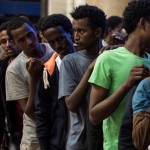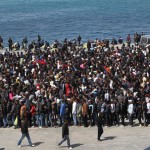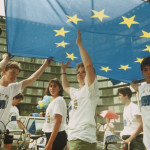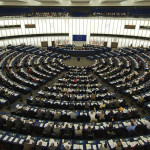The great European humanist, Erasmus of Rotterdam, lived and worked for sixteen years – from 1514 to 1529 and from 1535 until his death in July 1536 – in Basel. We have to ask ourselves today, would an Erasmus in Basel still be imaginable, or would he fall foul of the (planned) measures between Switzerland and the European Union?
On 9 February 2014, 55.8% of the Swiss electorate voted on an initiative to introduce quantitative limits to immigration, coming out in favour of the proposal by a hair’s breadth – 50.3% to 49.7%. This initiative was put forward by the Schweizerische Volkspartei (Swiss People’s Party), who claim that Switzerland has lost control of immigration into the country. The main cause is seen as the uncontrolled influx of migrants from the EU, with which Switzerland has concluded bilateral treaties that include adopting the free movement of people, one of the four fundamental freedoms of the EU.
The European Commission reacted immediately to the results of the referendum. In a press release issued on the evening of the same day, it announced that it would “examine the implications of this initiative on EU-Swiss relations as a whole. In this context, the Federal Council’s position on the result will also be taken into account”. According to Commission President Barroso, Switzerland cannot fully benefit from the advantages of the Single Market while at the same time limiting access by EU citizens, when such restrictions do not exist for Swiss citizens entering the EU. “There can be no cherry-picking,” stated President of the EU Parliament, Martin Schulz. It is still uncertain exactly how the situation will develop: the Federal Council has three years in which to progress the implementation of the referendum.
ERASMUS: the first victim?
As an initial step, Switzerland has not signed the already-negotiated treaty for the free movement of people with new EU member Croatia. As a result, the EU suspended negotiations for Switzerland’s participation in the EU research programme “Horizon 2020” and the “ERASMUS+” programme. These actions, the EU’s first specific reaction to the referendum, affect a group that may in fact have voted against the initiative, as part of the majority of the electorate who actually voted; but at the same time this group largely failed to participate in the voting: only 17% of young people voted, compared with more than 70% of the over-50s. However, on the evening of the referendum it dawned on many students that they could be a (first) victim of the referendum. Hundreds of students demonstrated on the streets of Zurich and other major cities.
Switzerland cooperates with the EU and is effectively part of the European Economic Area within a framework of seven treaties. The “Guillotine clause” concerning the treaties means that all seven treaties cease to apply if one of them is terminated. This includes the treaty for Switzerland’s participation in the ERASMUS student exchange programme, to date the most successful programme of the EU.
However it should not be forgotten that the negotiations between Switzerland and the European Union regarding this programme have not augured entirely well: since 2012 Switzerland has sought to negotiate renewal of its participation in ERASMUS, so far unsuccessfully. The EU justified its refusal by saying that the legal basis for the programme must first be adopted before further talks could be held. This was decided on 11 December 2013, leaving only 8 weeks for the negotiations, which began with a surprise for Switzerland. Instead of the CHF 185 million approved by the Swiss Federal Council, the European Commission demanded CHF 370 million for Swiss participation in the programme. The Swiss government sought to gain some time, so that a final vote on Switzerland staying in the programme need not be voted on until 2016. Leaving the programme would mean that the Swiss government would have to implement national measures to monitor academic and scientific activities by Swiss researchers in EU countries. The exclusion from ERASMUS is not only painful for Swiss nationals: how many young Europeans would no longer be able to study at the ETH Zurich or the St. Gallen research university, both top-ranking European research institutions?
In a Statement the “European University Association” called on both the EU and the Swiss government to do all they could to enable Switzerland to participate in all European research and study programmes, now and in the future. It would be inexcusable if Swiss academics were excluded from a future Erasmus programme…
Per sedici anni, dal 1514 al 1529, e dal 1535 alla sua morte, avvenuta nel luglio del 1536, il grande umanista europeo Erasmo da Rotterdam visse e operò a Basilea. Domandiamoci: oggi un Erasmo nella città di Basilea sarebbe ancora concepibile o sarebbe vittima delle misure messe in atto tra la Svizzera e l’Europa?
Il 9 febbraio 2014, il 55,8% degli elettori svizzeri si è pronunciato su un’iniziativa per “l’introduzione di quote sull’immigrazione”, votando a favore con una maggioranza molto esigua. Il 50,3% contro il 49,7%. L’iniziativa era stata proposta dall’Unione democratica del centro (Udc), la quale ritiene che la Svizzera abbia perso il controllo in materia d’immigrazione. L’Udc adduce come motivo principale l’afflusso incontrollato di migranti provenienti dall’UE, con la quale la Svizzera, nel quadro degli accordi bilaterali, ha inoltre stipulato la libera circolazione delle persone, una delle quattro libertà fondamentali dell’Ue.
La sera dello scrutinio la Commissione europea ha immediatamente reagito al risultato del referendum: in un comunicato stampa ha annunciato che “esaminerà le implicazioni di questa iniziativa sull’insieme delle relazioni tra l’Ue e la Svizzera. In questo contesto, sarà inoltre presa in considerazione la posizione del governo svizzero su questo risultato”. La Svizzera, come ha dichiarato il presidente Barroso, non può trarre profitto dal mercato unico e allo stesso tempo limitare l’accesso dei cittadini europei, tanto più che queste barriere non esistono per i cittadini svizzeri all’interno dell’Unione. “Le parti della torta devono essere uguali”, ha aggiunto il presidente del Parlamento Martin Schultz. Come la situazione evolverà non lo sappiamo ancora: il governo svizzero ha tre anni di tempo per mettere in pratica l’esito del referendum.
Erasmus: prima vittima?
Per cominciare, la Svizzera non ha firmato l’accordo sulla libera circolazione delle persone già negoziato con la Croazia, il nuovo stato membro. Per questo, l’UE ha sospeso l’avanzamento dei negoziati relativi alla partecipazione della Svizzera al programma europeo per la ricerca “Horizon 2020” e a “Erasmus +”. Così facendo, questa prima concreta risposta dell’UE al referendum tocca un gruppo che certamente si era pronunciato in maggioranza contro l’iniziativa, ma che, allo stesso tempo, si era anche in maggioranza astenuto: solo il 17% dei giovani si è recato alle urne contro oltre il 70% degli ultra cinquantenni. La sera stessa del voto, molti studenti devono essersi resi conto che potrebbero essere le (prime) vittime di tale voto. A Zurigo, come in altre città, a centinaia sono scesi in strada per manifestare.
Nel quadro di sette accordi in totale, la Svizzera prende parte allo spazio economico comune dell’Unione. La clausola cosiddetta “ghigliottina“ degli accordi prevede che la risoluzione di un accordo rende nullo l’insieme degli accordi. Questo si applica anche all’accordo sulla partecipazione della Svizzera al programma di scambio di studenti Erasmus, il programma Ue che fino a questo momento ha registrato il maggior successo.
Non bisogna tuttavia dimenticare che i negoziati tra la Svizzera e l’Unione europea a proposito dell’Erasmus non si erano svolti sotto i migliori auspici: dal 2012 la Svizzera aveva tentato, senza successo, di negoziare con la Commissione il rinnovo della partecipazione al programma. La Commissione europea ha motivato il suo rifiuto argomentando che, in un primo momento, il principio giuridico alla base del programma doveva essere adottato prima di poter intraprendere altre discussioni, cosa che è avvenuta l’11/12/2013. Restavano dunque solo otto settimane per i negoziati, cominciati con una sorpresa per la Svizzera. Invece dei 185 milioni di franchi svizzeri approvati dal governo elvetico, la Commissione europea ne ha chiesti 370 per la partecipazione della Svizzera al programma. Il governo ha cercato di prendere tempo per, in fin dei conti, non dover votare al Consiglio federale una permanenza supplementare nel programma fino al 2016. Un’uscita dal programma significherebbe per il governo una presa in carico di misure nazionali d’accompagnamento alle attività scientifiche degli svizzeri nei paesi stranieri membri dell’UE. L’esclusione dall’Erasmus non è deprecabile solo per gli svizzeri: quanti giovani studenti europei non studiano a l’École polytechnique fédérale di Zurigo o all’Université d’économie di San Gallo, istituti di ricerca europei di prim’ordine?
L’Associazione europea dell’università ha lanciato una petizione (http://www.not-without-switzerland.org/it/) in cui chiede tanto all’Ue quanto al governo elvetico di adoperarsi per permettere la partecipazione della Svizzera a tutti i programmi europei di ricerca e formazione. Sarebbe in effetti imperdonabile che un futuro Erasmo passi sotto il naso degli svizzeri…
Erasmus ohne Schweiz?
Sechzehn Jahre, von 1514 bis 1529, und von 1535 bis zu seinem Tod im Juli 1536, lebte und wirkte der große europäische Humanist Erasmus von Rotterdam in Basel. Heute müssen wir uns fragen: wäre ein Erasmus in Basel noch denkbar oder würde er den (geplanten) Maßnahmen zwischen der Schweiz und der Europäischen Union zum Opfer fallen?
Am 9. Februar 2014 haben 55,8% der Schweizer Wähler über eine Initiative zur „Einführung mengenmäßiger Beschränkungen der Einwanderung“ abgestimmt und sich hauchdünn – 50,3 zu 49,7 Prozent – dafür ausgesprochen. Diese Initiative war von der Schweizerischen Volkspartei initiiert worden, die findet, dass die Schweiz die Kontrolle über die Einwanderung verloren habe. Als Hauptursache sieht sie den unkontrollierte Zustrom von Zuwanderern aus der EU, mit der die Schweiz in bilateralen Verträgen auch die Personenfreiheit – eine der vier Grundfreiheiten der EU – mit übernommen hat.
Die Europäische Kommission reagierte auf das Ergebnis des Referendums unmittelbar: in einer Presseaussendung vom Abend des Abstimmungstages kündigte sie an, „die Folgen dieser Initiative für die Gesamtbeziehungen zwischen der Union und der Schweiz zu analysieren. In diesem Zusammenhang wird auch die Position des Bundesrates zum Abstimmungsergebnis berücksichtigt werden“. Die Schweiz könne nicht, so Kommissions-Präsident Barroso, die Vorteile des Binnenmarktes in vollem Umfang nutzen, gleichzeitig aber EU-Bürgern den Zugang zu beschränken, während diese Schranken nicht für Schweizer Bürger in der EU bestünden. „Es kann keine Rosinenpickerei geben“, sekundierte Parlamentspräsident Schulz. Wie es genau weitergeht, ist noch unsicher: der Bundesrat hat drei Jahre Zeit, die Umsetzung des Referendums zu konkretisieren.
ERASMUS: erstes Opfer?
Als ersten Schritt unterzeichnete die Schweiz das bereits fertig verhandelte Personenfreizügigkeitsabkommen mit dem EU-Neumitglied Kroatien nicht. Darauf hin setzte die EU die Fortsetzung der Verhandlungen zur Teilnahme der Schweiz am EU-Forschungsprogramm „Horizont 2020“ und an „ERASMUS+“ aus. Damit trifft die erste konkrete Reaktion der EU auf das Referendum eine Gruppe, die zwar mehrheitlich gegen die Initiative gestimmt hatte, gleichzeitig aber auch mehrheitlich den Abstimmungsurnen ferngeblieben war: nur 17% der Jungen gab ihre Stimme ab, gegenüber von mehr als 70% bei den über 50-Jährigen. Noch am Abend der Abstimmung dürfte allerdings vielen Studenten gedämmert haben, dass sie ein (erstes) Opfer der Abstimmung sein könnten. In Zürich und anderen Städten demonstrierten sie zu Hunderten auf den Strassen der Großstädte.
Die Schweiz nimmt im Rahmen von insgesamt sieben Verträgen am gemeinsamen Wirtschaftsraum mit der EU teil. Die sogenannte „Guillotine-Klausel“ der Verträge bedeutet, dass alle Verträge mit der Aufkündigung eines Vertrages hinfällig werden. Das gilt auch für den Vertrag zur Teilnahme der Schweiz am Studentenaustauschprogramm ERASMUS, dem bisher wohl erfolgreichsten Programm der EU.
Allerdings darf nicht ganz vergessen werden, dass die Verhandlungen zu diesem Programm zwischen der Schweiz und der Europäischen Union nicht gerade unter einem guten Stern standen: die Schweiz hatte seit 2012 versucht, die Erneuerung ihrer Teilnahme an ERASMUS mit der Kommission zu verhandeln, allerdings ohne Erfolg. Die EU-Kommission begründete ihre Verweigerung mit dem Hinweis, das erst die Rechtsgrundlage für das Programm verabschiedet sein müsse, bevor man in weitere Gespräche eintreten könne. Am 11. 12. 2013 wurde diese beschlossen. Damit blieben nur noch 8 Wochen für die Verhandlungen, die mit einer Überraschung für die Schweiz begannen. Statt der vom Schweizer Bundesrat genehmigten 185 Mio. sFr verlangte die Europäische Kommission 370 Mio sFr. für eine Schweizer Beteiligung am Programm. Die Schweizer Regierung versuchte Zeit zu gewinnen, um im Bundesrat erst 2016 letztlich über einen weiteren Verbleib im Programm abstimmen zu müssen. Ein Ausstieg aus dem Programm würde bedeuten, dass die Schweizer Regierung durch nationale Begleitmassnahmen die wissenschaftlichen Aktivitäten von Schweizern im EU-Ausland übernehmen muss. Der Ausschluss aus ERASMUS ist nicht nur für Schweizer schmerzhaft: wieviele junge Europäer studieren nicht an der ETH Zürich oder an der Wirtschaftsuniversität St. Gallen, beide höchstrangige europäische Forschungsinstitute.
In einer Stellungnahme rief die „European University Association“ sowohl die EU wie die Schweizer Regierung dazu auf, alles zu unternehmen um eine Teilnahme der Schweiz an allen Europäischen Forschungs- und Studienprogrammen auch in der Zukunft zu ermöglichen. Es wäre unentschuldbar, wenn den Schweizern ein zukünftiger Erasmus durch die Lappen ginge…
Erasmus sans Suisse?
Seize années durant, de 1514 à 1529, et de 1535 à sa mort, survenue en juillet 1536, le grand humaniste européen, Érasme de Rotterdam, vécut et œuvra à Bâle. Posons-nous la question: aujourd’hui, un Érasme en la ville de Bâle serait-il encore concevable ou serait-il victime des mesures qu’envisagent entre elles la Suisse et l’Union européenne?
Le 9 février 2014, 55,8 % des électeurs suisses se sont prononcés sur une initiative pour l’«introduction de quotas à l’immigration» et ont voté en faveur à une majorité très serrée: 50,3 contre 49,7 %. Cette initiative a été formée par l’Union démocratique du centre (UDC), qui estime que la Suisse a perdu le contrôle de son immigration. L’UDC y voit comme explication première l’afflux non maîtrisé de ressortissants en provenance de l’UE, avec laquelle la Suisse a, dans le cadre d’accords bilatéraux, consenti également à la liberté de circulation des personnes, qui est l’une des quatre libertés fondamentales de l’UE.
Au soir du scrutin, la Commission européenne a aussitôt réagi au résultat de ce référendum: dans un communiqué de presse, elle a annoncé qu’elle «examinera les implications de cette initiative sur l’ensemble des relations entre l’Union et la Suisse. Dans ce contexte, la position du Conseil fédéral sur le résultat sera aussi prise en compte». La Suisse, ainsi que l’a déclaré le président Barroso, ne peut pas tirer pleinement profit du marché unique et limiter en même temps l’accès des citoyens de l’UE, alors même que ces barrières n’existent pas pour les citoyens suisses à l’intérieur de l’UE. «Les parts de gâteau doivent être égales», a ajouté le président du Parlement, Martin Schulz. Comment la situation va-t-elle évoluer exactement, on l’ignore encore: le Conseil fédéral a trois ans pour concrétiser la mise en œuvre du référendum.
ERASMUS: première victime?
Pour commencer, la Suisse n’a pas cosigné l’accord sur la libre circulation des personnes déjà négocié avec la Croatie, le nouveau membre de l’UE. Sur ce, l’UE a suspendu la poursuite des négociations relatives à la participation de la Suisse au programme de l’UE pour la recherche «Horizon 2020» et à «ERASMUS+». Ce faisant, cette première réponse concrète de l’UE au référendum touche un groupe qui certes avait voté majoritairement contre l’initiative, mais qui, dans le même temps, s’était aussi majoritairement abstenu de voter: seuls 17 % des jeunes se sont rendus aux urnes, contre plus de 70 % chez les plus de 50 ans. Le soir même du vote, nombre d’étudiants auraient en effet pris conscience qu’ils pourraient bien être les (premières) victimes de ce vote. À Zürich et dans d’autres grandes villes, ils se sont rassemblés par centaines pour manifester dans les rues.
Dans le cadre de sept accords au total, la Suisse est partie prenante à l’espace économique commun avec l’UE. La clause dite «guillotine» des accords signifie que la résiliation d’un accord rend caduc l’ensemble des accords. Cela s’applique également à l’accord sur la participation de la Suisse au programme d’échange d’étudiants ERASMUS, le programme de l’UE qui jusqu’ici a enregistré le plus de succès.
Toutefois, il ne faut pas oublier non plus que les négociations entre la Suisse et l’Union européenne sur ce programme n’avaient pas vraiment démarré sous les meilleurs auspices: depuis 2012, la Suisse avait tenté, mais sans succès, de négocier avec la Commission le renouvellement de sa participation à ERASMUS. La Commission européenne a motivé son refus, arguant que, dans un premier temps, la base juridique établissant ce programme devait être adoptée avant de pouvoir engager d’autres discussions. Celle-ci a été approuvée le 11/12/2013. Il ne restait alors que huit semaines pour les négociations, qui ont commencé par une surprise pour la Suisse. Au lieu des 185 millions de francs suisses approuvés par le Conseil fédéral, la Commission européenne a demandé 370 millions de francs pour une participation suisse au programme. Le gouvernement helvétique a essayé de gagner du temps pour, en fin de compte, ne devoir voter en Conseil fédéral un maintien supplémentaire dans le programme qu’en 2016. Une sortie du programme signifierait que le gouvernement suisse doit prendre en charge par des mesures nationales d’accompagnement les activités scientifiques des Suisses dans les pays étrangers membres de l’UE. L’exclusion d’ERASMUS n’est pas seulement regrettable pour les Suisses: combien de jeunes Européens étudient pas à l’École polytechnique fédérale (ETH) de Zürich ou à l’Université d’économie de Saint-Gall, toutes deux des instituts de recherche européens de premier rang.
Dans une tribune, l’«Association européenne de l’université» a appelé tant l’UE que le gouvernement helvétique à tout mettre en œuvre pour permettre à l’avenir une participation de la Suisse à l’ensemble des programmes européens de recherche et de formation. Il serait en effet inexcusable qu’un futur Érasme passe sous le nez des Suisses…
Michael Kuhn
www.europe-infos.eu
Latest posts by Michael Kuhn (see all)
- Erasmus without Switzerland? - 7 maggio 2014











